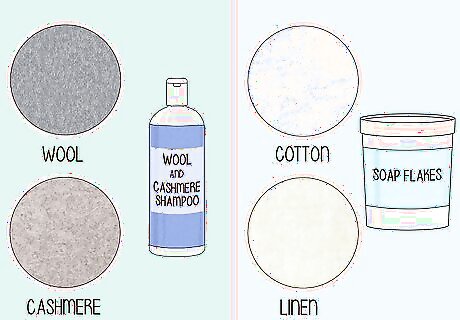
views
- Wet a small spot on your suit and then rub it with a cotton swab. If no dye transfers to the swab, you can machine-wash it.
- Wash your suit inside of a mesh laundry bag on a cold, gentle setting to clean your suit while avoiding wear and tear.
- Maintain your suit by spot cleaning it regularly and storing it carefully on a wooden hanger.
Washing Your Suit

Wash your suit as infrequently as possible, since it's probably very delicate. Machine washes and dry cleanings both pose a risk to your suit. Your suit is a highly structured garment that's often made of fragile material. Only wash your suit when it's really necessary—if you’re not sure, go off of the smell. If your suit smells at all of body odor, it’s time for a full machine wash or dry clean. When you do wash, choose between machine washing and dry cleaning. Handwashing isn't advisable, because if you accidentally give your suit an uneven wash, it could warp your suit's fit over time. Professional dry cleaning tends to be the best option for keeping the suit in the best possible shape. If you'd really rather hand wash though, go with ice-cold water and a gentle cleaning agent. You obviously do not want to wear a dirty suit, so it's important to strike a balance between repeat usages and infrequent cleaning.

Test your suit to determine whether or not it can be washed. Find a small patch of fabric on your suit (ideally, one you can't see when the suit is worn). Get the quarter-sized area damp and then, dab a cotton swab over the damp area. Finally, check the swab—has it changed color? If dyes are leaking onto the swab, that indicates that a hand or machine wash isn’t right for your garment. This means you'll need to find a dry cleaner. If you wash this garment, it'll hurt the fabric. Though many suits will have a "dry clean only" label, you can ignore this. If your suit has this tag, see this as a reminder to handle your garment with care. The jury is out on which fabrics definitely can or definitely can't get spruced in the wash. If you're unsure, a quick test is the best solution!

Choose a gentle cleaner and match it to your suit's fabric type. Whether your suit is wool, cotton, cashmere, or linen, a standard laundry detergent will be too harsh. Instead, grab a gentler cleaner that’s perfect for your suit type. For wool and cashmere, select a wool and cashmere shampoo. For all other suits, choose soap flakes instead.

Fold and roll your suit jacket in preparation for the wash. Unlike other garments, fragile suit jackets can't just be tossed into the machine. Instead, turn your suit jacket inside out. Then, fold your suit lengthwise, laying the sleeves over the suit’s body. Using your hands, flatten creases out of the suit. Finally, tightly roll up your suit from the bottom upwards, just like you would a sleeping bag.

Place your suit inside a mesh laundry bag. Water isn’t the only danger suits face in the machine. When they toss and tumble around during their regular cycle, it can seriously warp the fragile fabric. This is where mesh bags come in. Set your folded and rolled suit carefully inside, then tie the latch. Now your suit will stay safe in the wash! Wash your suit by itself in your machine, just to be safe. This will limit friction in the wash.

Wash your suit jacket on the coldest, gentlest setting. Some claim that with the protection of a mesh bag, any cycle is fine for washing your suit jacket. Still, it’s best to play it safe with fragile jackets. Select the “cold” and “delicate” settings for your wash cycle. Load your cleaning agent and finally, run your machine. Put your wool shampoos in the detergent compartment and for soap flakes, place them directly into the main wash compartment.

Remove your garment immediately to be air dried (and skip the dryer!). Proper drying is extremely important to maintain your suit's proper shape and fit. Lay your suit flat on a clean surface and use your hands to pat out as many creases and folds as you can. Allow your jacket to air dry instead of throwing it in the dryer. When it's still a little damp, hang your jacket on a hanger. Resist the urge to put your suit in front of a heat source, like sunlight or a heater. This can easily warp the fabric. Pro tip: lay a towel over a flat surface when you first remove your jacket. Gently lay the suit on top and roll the towel and jacket up together. This will squeeze out some water, cutting down on drying time!
Spot Cleaning, Brushing, and Storing Your Suit

Spot clean small stains with lemon juice or distilled vinegar. Spill something unsightly on your suit sleeve? Only fully wash your suit on occasion, and in between washes, use spot cleaning to spruce up your suit. Dab cold water onto your stain and a couple drops of lemon juice or distilled vinegar. Blot with a clean towel until the stain lifts. To test whether your suit can handle a spot clean, first test the suit in a hidden portion of the suit. Blot your suit with a little bit of lemon juice or vinegar, then check the cotton swab. Did the color run? If so, take your suit to the cleaners. When you’re applying lemon juice or vinegar, less is more. Start with just a couple drops and increase the amount slightly as needed.

Brush your suit after every wear with a suit brush. Brush over your entire suit, moving in a downward motion. This removes dust and grime from your suit—and it’ll help your suit look great for longer. Removing visible debris is important, but the benefits go deeper, too. Leftover particles put extra stress on your suit’s fabric, causing it to wear down over time. Brushing removes that risk!

Steam your suit jacket to remove wrinkles. Add water to your iron’s steam well, adjust to the proper setting for your suit’s material, and place a white cloth over your suit. Steam and iron out wrinkles by pressing onto the jacket, not rubbing. Work around your suit in this way and before moving around, check that you haven’t accidentally created new wrinkles while ironing. Anything that stresses your fabric will hurt a suit over time—steaming helps limit this risk. Pro tip: you can get the same effect by steaming with an actual steamer. Or, you can hang your jacket in the bathroom while you take a steamy shower with the door closed.

Store your jackets on wooden hangers and inside of cloth bags. Wire hangers are a suit jacket's greatest enemy, as they cause the fabric to warp over time. Instead, hang your suit on high-quality wood hangers made for suit jackets. Then, throw a cloth suit bag over top of your jackets as well. This allows your suit to breathe, keep its shape, and avoid damage by moths, all at once.

Wear individual jackets as infrequently as possible. When you have a job that requires you to wear a suit every day, resting your jackets in between wears might be tough. But if you can, try your best to alternate. This way, in between wears, your jacket has time to rest and de-wrinkle on its wooden hanger.


















Comments
0 comment